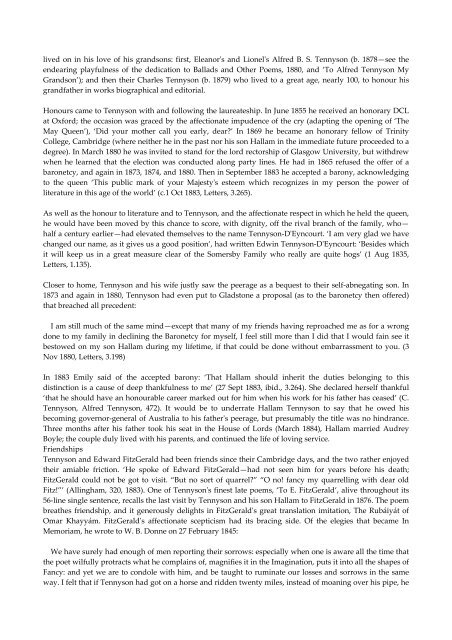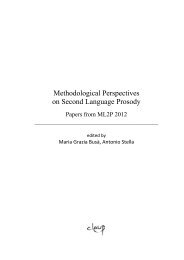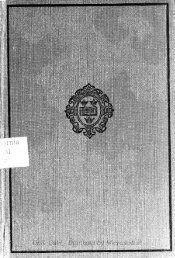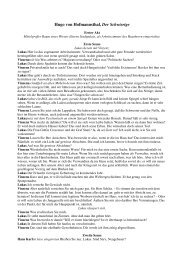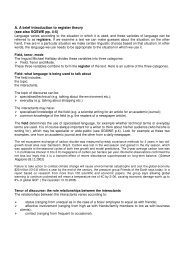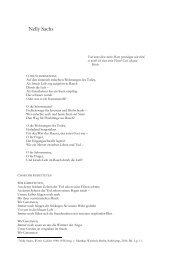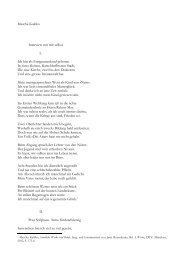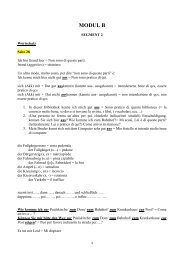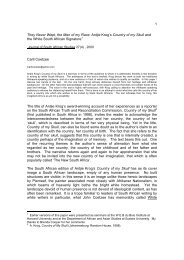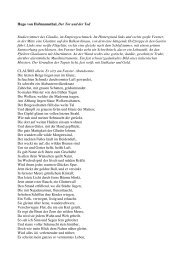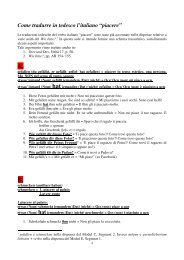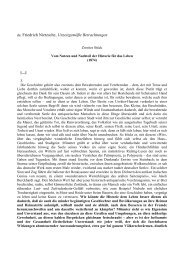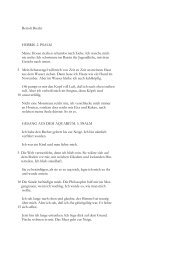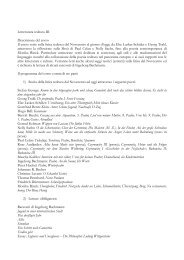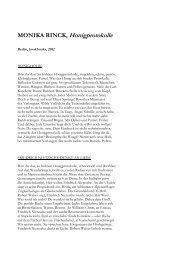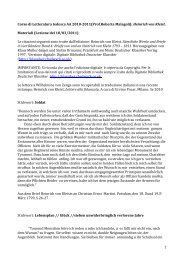The lives of the poets from The Dictionary of National Biography ...
The lives of the poets from The Dictionary of National Biography ...
The lives of the poets from The Dictionary of National Biography ...
You also want an ePaper? Increase the reach of your titles
YUMPU automatically turns print PDFs into web optimized ePapers that Google loves.
lived on in his love <strong>of</strong> his grandsons: first, Eleanorʹs and Lionelʹs Alfred B. S. Tennyson (b. 1878—see <strong>the</strong><br />
endearing playfulness <strong>of</strong> <strong>the</strong> dedication to Ballads and O<strong>the</strong>r Poems, 1880, and ‘To Alfred Tennyson My<br />
Grandson’); and <strong>the</strong>n <strong>the</strong>ir Charles Tennyson (b. 1879) who lived to a great age, nearly 100, to honour his<br />
grandfa<strong>the</strong>r in works biographical and editorial.<br />
Honours came to Tennyson with and following <strong>the</strong> laureateship. In June 1855 he received an honorary DCL<br />
at Oxford; <strong>the</strong> occasion was graced by <strong>the</strong> affectionate impudence <strong>of</strong> <strong>the</strong> cry (adapting <strong>the</strong> opening <strong>of</strong> ‘<strong>The</strong><br />
May Queen’), ‘Did your mo<strong>the</strong>r call you early, dear?’ In 1869 he became an honorary fellow <strong>of</strong> Trinity<br />
College, Cambridge (where nei<strong>the</strong>r he in <strong>the</strong> past nor his son Hallam in <strong>the</strong> immediate future proceeded to a<br />
degree). In March 1880 he was invited to stand for <strong>the</strong> lord rectorship <strong>of</strong> Glasgow University, but withdrew<br />
when he learned that <strong>the</strong> election was conducted along party lines. He had in 1865 refused <strong>the</strong> <strong>of</strong>fer <strong>of</strong> a<br />
baronetcy, and again in 1873, 1874, and 1880. <strong>The</strong>n in September 1883 he accepted a barony, acknowledging<br />
to <strong>the</strong> queen ‘This public mark <strong>of</strong> your Majestyʹs esteem which recognizes in my person <strong>the</strong> power <strong>of</strong><br />
literature in this age <strong>of</strong> <strong>the</strong> world’ (c.1 Oct 1883, Letters, 3.265).<br />
As well as <strong>the</strong> honour to literature and to Tennyson, and <strong>the</strong> affectionate respect in which he held <strong>the</strong> queen,<br />
he would have been moved by this chance to score, with dignity, <strong>of</strong>f <strong>the</strong> rival branch <strong>of</strong> <strong>the</strong> family, who—<br />
half a century earlier—had elevated <strong>the</strong>mselves to <strong>the</strong> name Tennyson‐DʹEyncourt. ‘I am very glad we have<br />
changed our name, as it gives us a good position’, had written Edwin Tennyson‐DʹEyncourt: ‘Besides which<br />
it will keep us in a great measure clear <strong>of</strong> <strong>the</strong> Somersby Family who really are quite hogs’ (1 Aug 1835,<br />
Letters, 1.135).<br />
Closer to home, Tennyson and his wife justly saw <strong>the</strong> peerage as a bequest to <strong>the</strong>ir self‐abnegating son. In<br />
1873 and again in 1880, Tennyson had even put to Gladstone a proposal (as to <strong>the</strong> baronetcy <strong>the</strong>n <strong>of</strong>fered)<br />
that breached all precedent:<br />
I am still much <strong>of</strong> <strong>the</strong> same mind—except that many <strong>of</strong> my friends having reproached me as for a wrong<br />
done to my family in declining <strong>the</strong> Baronetcy for myself, I feel still more than I did that I would fain see it<br />
bestowed on my son Hallam during my lifetime, if that could be done without embarrassment to you. (3<br />
Nov 1880, Letters, 3.198)<br />
In 1883 Emily said <strong>of</strong> <strong>the</strong> accepted barony: ‘That Hallam should inherit <strong>the</strong> duties belonging to this<br />
distinction is a cause <strong>of</strong> deep thankfulness to me’ (27 Sept 1883, ibid., 3.264). She declared herself thankful<br />
‘that he should have an honourable career marked out for him when his work for his fa<strong>the</strong>r has ceased’ (C.<br />
Tennyson, Alfred Tennyson, 472). It would be to underrate Hallam Tennyson to say that he owed his<br />
becoming governor‐general <strong>of</strong> Australia to his fa<strong>the</strong>rʹs peerage, but presumably <strong>the</strong> title was no hindrance.<br />
Three months after his fa<strong>the</strong>r took his seat in <strong>the</strong> House <strong>of</strong> Lords (March 1884), Hallam married Audrey<br />
Boyle; <strong>the</strong> couple duly lived with his parents, and continued <strong>the</strong> life <strong>of</strong> loving service.<br />
Friendships<br />
Tennyson and Edward FitzGerald had been friends since <strong>the</strong>ir Cambridge days, and <strong>the</strong> two ra<strong>the</strong>r enjoyed<br />
<strong>the</strong>ir amiable friction. ‘He spoke <strong>of</strong> Edward FitzGerald—had not seen him for years before his death;<br />
FitzGerald could not be got to visit. “But no sort <strong>of</strong> quarrel?” “O no! fancy my quarrelling with dear old<br />
Fitz!”’ (Allingham, 320, 1883). One <strong>of</strong> Tennysonʹs finest late poems, ‘To E. FitzGerald’, alive throughout its<br />
56‐line single sentence, recalls <strong>the</strong> last visit by Tennyson and his son Hallam to FitzGerald in 1876. <strong>The</strong> poem<br />
brea<strong>the</strong>s friendship, and it generously delights in FitzGeraldʹs great translation imitation, <strong>The</strong> Rubáiyát <strong>of</strong><br />
Omar Khayyám. FitzGeraldʹs affectionate scepticism had its bracing side. Of <strong>the</strong> elegies that became In<br />
Memoriam, he wrote to W. B. Donne on 27 February 1845:<br />
We have surely had enough <strong>of</strong> men reporting <strong>the</strong>ir sorrows: especially when one is aware all <strong>the</strong> time that<br />
<strong>the</strong> poet wilfully protracts what he complains <strong>of</strong>, magnifies it in <strong>the</strong> Imagination, puts it into all <strong>the</strong> shapes <strong>of</strong><br />
Fancy: and yet we are to condole with him, and be taught to ruminate our losses and sorrows in <strong>the</strong> same<br />
way. I felt that if Tennyson had got on a horse and ridden twenty miles, instead <strong>of</strong> moaning over his pipe, he


